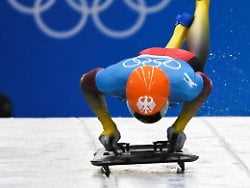Historic Olympic victory
Skeletonis race headfirst to gold and silver
2/11/2022 3:39 p.m
Christopher Grotheer wins the first German gold medal in skeleton, teammate Axel Jungk completes the double victory. The German dominance in the ice track of the Olympic Games in Beijing remains unbroken: the lugers had previously won four out of four competitions.
After his ride in the history books, Christopher Grotheer controlled his emotions like he had controlled his sled in the Yanqing ice track. Moved, Germany’s first Olympic skeleton champion sang along with the anthem and successfully fought back tears of joy after the continuation of the German Gold Festival. One day after the end of the luge competitions with a total of four gold medals, the world champion raced ahead of his teammate Axel Jungk to the greatest success of his career. China’s Yan Wengang won bronze.
“I’ve dreamed of it for years. It’s all still so unreal, but I’m proud of myself. I won this gold in my head,” said Grotheer in a calm tone and promised: “After two beers I’m a bit more relaxed.” Olympic gold is the absolute sporting jackpot for the Thuringian with a constant resting heart rate. And he can split the 20,000 euro prize money between two major projects: for the new house near Oberhof and for the wedding with his pregnant girlfriend Mary Ann in May, who was very moved at home and said on the ARD microphone: ” I’m so proud of what he did. Not many believed in him.”
“Had a great last two years”
Speed freak Grotheer – privately he drives a 200 hp Kawasaki – was untouchable on the track north of Beijing. “The first three runs were amazing, in the fourth run he played it safe,” said head coach Christian Baude on ARD. In the end, Grotheer was 0.66 seconds ahead of Jungk. For years, Baude’s protégés at the Olympics were considered those who had been left behind and who didn’t deliver. Everything was different in Yanqing. “Everyone was super hot. We had a super cool last two years and wanted to show that we can also win medals at the Olympics,” said Grotheer.
Jungk’s silver medal deserves a similar rating as the police officer’s triumph. The 30-year-old from BSC Oberbärenburg was infected with the corona virus after the World Cup final in St. Moritz, trembled for a long time about participating in the Olympics and was unable to prepare as planned. Even when entering China, not everything went smoothly due to his illness. “It all paid off, all the physical problems. It was worth it. It’s just an incredibly nice feeling,” said Jungk.
The next German medal could already be won by the skeleton pilots on Saturday. After two of four runs, the trio of Hannah Neise, Tina Hermann and Jacqueline Lölling is in second, third and fifth place. Olympic debutant Neise from Winterberg is second, 0.21 seconds behind the leading Australian Jaclyn Narracott. World champion Tina Hermann from WSV Königssee finished third on Friday and is only two hundredths of a second behind Neise. The decision in the medal fight will be made in the fourth race on Saturday (2:55 p.m. CET).
Ex-ski jumper with top speed
Grotheer already had the precious metal around his neck on Friday evening local time. And that’s just two years after he hadn’t even qualified for the German World Cup team. The career of the veteran was not straight anyway. At the age of 15, Grotheer still wanted to be a ski jumper. However, because he was too heavy for it, he switched to the ice track, where he has been competing in the World Cup since 2012.
At its Olympic premiere four years ago in Pyeongchang, Grotheer finished eighth. For the Gold project, the experienced pilot went his own way, even turning the Olympic sled into a corner. Things went much better for Grotheer with his old sled. With over 130 km/h on the old model, Grotheer set the top speed in the field on the first day and set a track record of 1:00.00 minutes.
